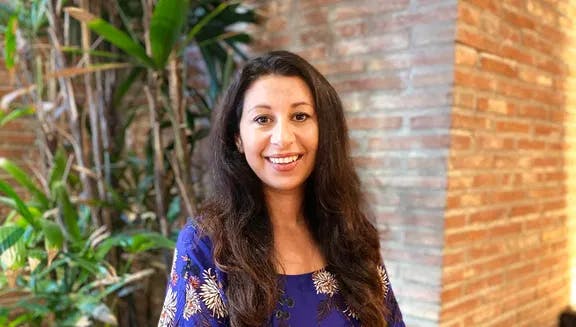#FoundersFridays: Meet Ling Lin

#FoundersFridays is a StartupAmsterdam interview series: for entrepreneurs, by entrepreneurs. Each hero answers questions on their entrepreneurial journey, their learnings, milestones and bottlenecks, as well as on Amsterdam and the Dutch startup scene. It’s a platform for entrepreneurs to speak their minds freely and pass on their learnings to anyone who’s thinking about founding a startup as well.
This week we spoke to Ling Lin, co-founder and chief product officer of Grip, which offers a hormonal and fertility test that you can take from the comfort of your home. The Grip test aims to provide all people with ovaries easier access to information about their bodies, hormonal health and fertility.
What led you to start Grip Fertility?
Grip was started by me (33, product manager), Noor (31, medical doctor), and Anne Marie (32, investor) in March 2020,
We believe it should be possible for people with ovaries to make choices based on information about *their* body, rather than national averages. Google and information about ‘others’ just isn’t good enough.
When I turned 30, the fact that fertility declines with age became more real as people around me were starting to have kids and/or thinking about egg freezing.
I know I want kids, but not in the next few years. I felt it would be too naive to take the ‘worry when it comes’ and ‘hope for the best’ approach, especially when it comes to something that’s mostly biological.
So I started looking into ways to better understand where my body and my fertility status stood. I saw that doctors can run tests to assess one’s fertility status, but that’s only available to people who have been trying for 12 months or more (6 months if the female partner is 35 or older) - even though those hormones are not related to how long one has been trying.
This meant that single women, same sex couples, or couples who are not trying for a baby yet don’t have access to such a test. It was also not possible to get referred even though I was willing to pay myself. I was in awe that in today’s world, I was not able to get access to information about my own body.
Then I met Anne Marie and Noor - we all experienced this frustration. As such, we wanted to make it possible for all people who want insights about their bodies to get this information easily.

Why did you choose Amsterdam to start & grow your business? How has the local ecosystem supported you through your journey?
Amsterdam is extremely international and has a great pool of talent. The city is also amazing to live in. There is a lot of support for entrepreneurs, such as the startup visa. It was also very easy to build a network as people here are very supportive of startup founders. We had a lot of prominent local coverage early on and that can be difficult to achieve in big cities such as London, Berlin and New York.
In the Netherlands, only 5% of funding goes to mixed- & female-founded startups and scaleups. What was your personal experience with this?
Five percent goes to mixed & female lead startups, and only 0.8% go to female-only founding teams. I believe to change this, clear actions have to be taken.
Because there is less funding going to mixed/female-founded startups, there are also fewer examples of unicorns that are mixed/female-founded.
When VCs do due diligence, a big part of the process is to benchmark - it's easy to benchmark to something that is already successful. As a result, you’d consider startups that are similar to existing successful companies 'less risky' bets. One of those criteria could be the team composition. Aside from the startup’s team composition, venture capital firms also lack diversity. According to Forbes, 58% of venture capitalists are white men, 20% are Asian men, 11% are white women, 6% are Asian women, 2% are Black men, and 1% Black women, 1% are Latinx men, and nearly 0% are Latinx women.
As we are in the femtech space, when pitching to investors that are all male, we do need to spend a bit more time explaining the pain points.
What’s the most valuable piece of advice you’ve been given?
Find co-founders that can pick you up when you are down and vice versa. I am so lucky to have amazing co-founders - I think we all would have given up many times over if we were going at it on our own. So, I highly recommend finding a strong supportive network around yourself.
How are you approaching diversity and inclusion as you build your team?
As a fem-tech startup, our team is predominantly female - and luckily from different cultural backgrounds. There was one time where we ended up extending an offer to a male candidate instead of a female candidate as both were equally strong but we wanted diversity (in this case reverse diversity). We believe diversity is super important to the success of a company - it allows us to look at things from different perspectives and learn from each other.
Want to learn more about the women breaking through the startup scene? Check out this roundup of Amsterdam’s wonder women.
Related articles

#FoundersFridays: Meet Kirsty Sharman

#FoundersFridays: Meet Marieke van Iperen

#FoundersFridays: Meet Tim van Alphen

#FoundersFridays: Meet Joris Oudejans

#FoundersFridays: Meet Maxime ten Brinke

#FoundersFridays: Meet Junjie de Graaff

#FoundersFridays: Meet Tom Remy

#FoundersFridays: Meet Nancy Shenouda

#FoundersFridays: Meet Emily Huberts
